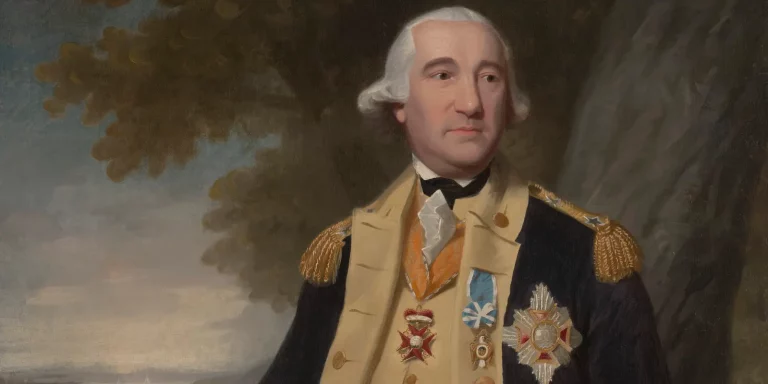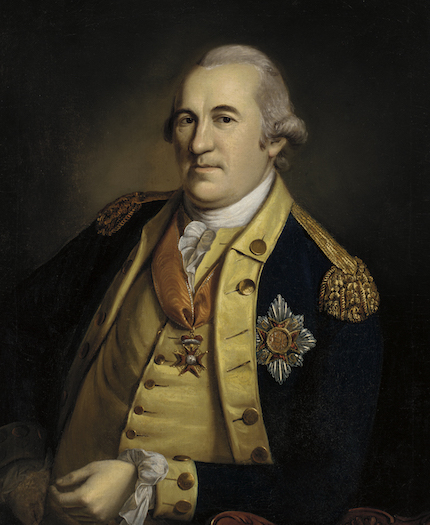
During von Steuben’s lifetime, the concept of gay marriage, gay pride or coming out was unthinkable and there was no language or open culture of homosexuality. But historical homosexual relationships were actually common. That doesn’t mean being gay was condoned: Sodomy was a crime in colonial America. But romantic relationships between men were widely tolerated until the 19th century, and only in the early 20th century did the U.S. military begin officially discriminating against people suspected to be gay.
New York, N.Y. Baron Friedrich von Steuben (1730-94, age 64) was a Prussian military officer who played a leading role in the American Revolutionary War by reforming the Continental Army into a disciplined and professional fighting force. His contributions marked a significant improvement in the performance of U.S. troops, and he is consequently regarded as one of the fathers of the U.S. Army. And he was gay.
During von Steuben’s lifetime, the concept of gay marriage, gay pride, or coming out was unthinkable, and there was no language or open culture of homosexuality. But historical homosexual relationships were actually common. That doesn’t mean being gay was condoned: Sodomy was a crime in colonial America. But romantic relationships between men were widely tolerated until the 19th century, and only in the early 20th century did the U.S. military begin officially discriminating against people suspected to be gay.
Born into a military family, Steuben was exposed to war from an early age; at 14 years old, he observed his father directing Prussian engineers in the 1744 Siege of Prague. At age 16, he enlisted in the Prussian Army, which was considered the most professional and disciplined in Europe.
During his 17 years of military service, Steuben took part in several battles in the Seven Years’ War (1756–1763), rose to the rank of captain, and became aide-de-camp to King Frederick II of Prussia, who was renowned for his military prowess and strategy. Steuben’s career culminated in his attendance of Frederick’s elite school for young military officers, after which he was abruptly discharged from the army in 1763, at the age of 33, possibly after being outed.
Homosexuality was viewed as a criminal aberration by many of his peers.
Rather than stay and provide a defense, rather than call upon his friends to vouch for his reputation, von Steuben chose to flee his homeland.

In 1775, as the American Revolution had begun, he joined the U.S. war effort through mutual French contacts with U.S. diplomats, most notably ambassador to France Benjamin Franklin. Franklin, who recommended von Steuben to Washington, played up his qualifications. He also downplayed rumors that the baron had been dismissed from the Prussian military for homosexuality. Franklin didn’t seem to think von Steuben’s private life was relevant to his military qualifications.
Von Steuben had arrived in America with his young aide-de-camp Louis de Pontière, his 17-year-old military secretary and rumored-to-be lover Pierre Etienne Du Ponceau, and his Italian Greyhound Azor, which he took with him everywhere. They traveled through Boston to Pennsylvania, arriving at Valley Forge in 1778.
There, very quickly, he began close relationships with Benjamin Walker and William North, both military officers in their 20s. Von Steuben formally adopted Walker and North and made them his heirs. Gay men at that time would often use adoption as a substitution for marriage.
The Continental Congress had relocated to Valley Forge after being ousted from Philadelphia by the British advance. One soldier’s first impression of the Baron was “of the ancient fabled God of War … he seemed to me a perfect personification of Mars. The trappings of his horse, the enormous holsters of his pistols, his large size, and his strikingly martial aspect, all seemed to favor the idea. He turned the volunteers into a great army.”
Washington knew of the accusations about von Steuben but ignored them.
He welcomed von Steuben to his camp and assigned Alexander Hamilton and John Laurens—both of whom were involved in what some historians have dubbed a “romantic friendship”—as his aides. Washington approved of von Steuben.
“He appears to be much of a gentleman,” Washington wrote when the baron arrived at camp, “and as far as we have had an opportunity of judging, a man of military knowledge, and acquainted with the world.”
Steuben picked 120 men from various regiments to form an honor guard for General Washington, and used them to demonstrate military training to the rest of the troops. These men in turn trained other personnel at regimental and brigade levels. Steuben’s eccentric personality greatly enhanced his mystique. In full military dress uniform, he twice a day trained the soldiers who, at this point, were themselves greatly lacking in proper clothing.
As he could only speak and write a small amount of English, Steuben originally wrote the drills in German and French. His secretary, Du Ponceau, then translated the drills from French into English, with the help of John Laurens and Alexander Hamilton, two of Washington’s aides-de-camp. They did this every single night so Washington could command his soldiers in the morning.
Colonel Alexander Hamilton and General Nathanael Greene were of great help in assisting Steuben in drafting a training program for the Army. The Baron’s willingness and ability to work with the men, as well as his use of profanity (in several languages), made him popular among the soldiers.
After the war, von Steuben legally adopted both men—a common practice among gay men in an age before same-sex marriage was legal. They lived together, managing his precarious finances. When the war ended, Baron von Steuben was granted U.S. citizenship and moved to New York with North and Walker. “We love him,” North wrote, “and he deserves it for he loves us tenderly.”
Steuben never married and had no children.
He left his estate to his companions and aides-de-camp, Walker and North, with whom he had had an “extraordinarily intense emotional relationship … treating them as surrogate sons.” A third young man, John W. Mulligan (1774–1862), who was also considered one of von Steuben’s “sons,” inherited his vast library, collection of maps, and $2,500 in cash.
Baron von Steuben: His Hidden Life and Unforgettable Contribution (July 23, 2023)
#BaronVonSteuben #USArmy #LGBTQHistory #MilitaryHistory #RevolutionaryWar #HistoricalFigures #Equality #LGBTQ+ #ThoughtLeader #GlobalCitizen
TAGS: Baron von Steuben, US Army, LGBTQ History, Military History, Revolutionary War, Historical Figures, Equality, LGBTQ+, Thought Leader, Global Citizen